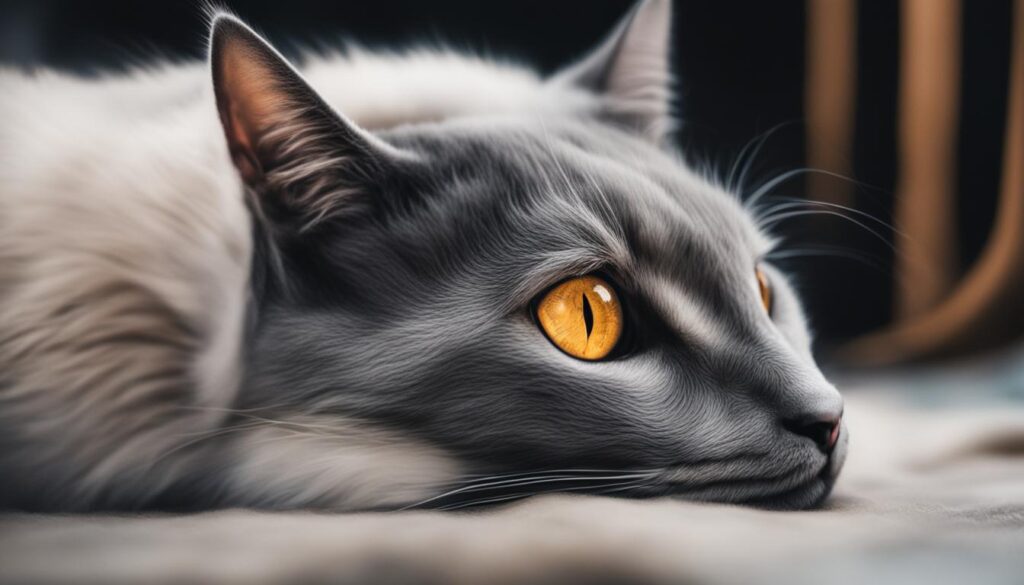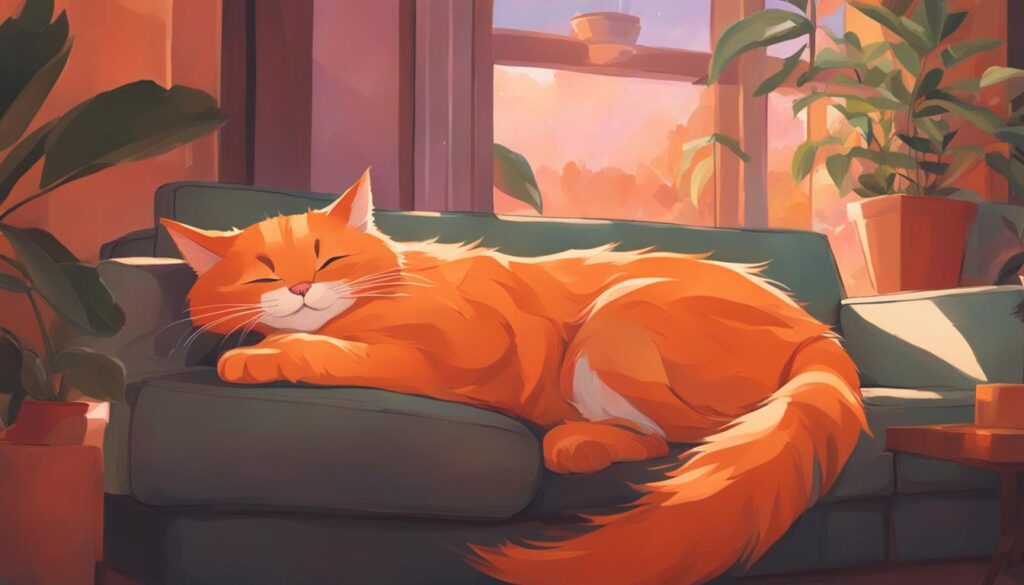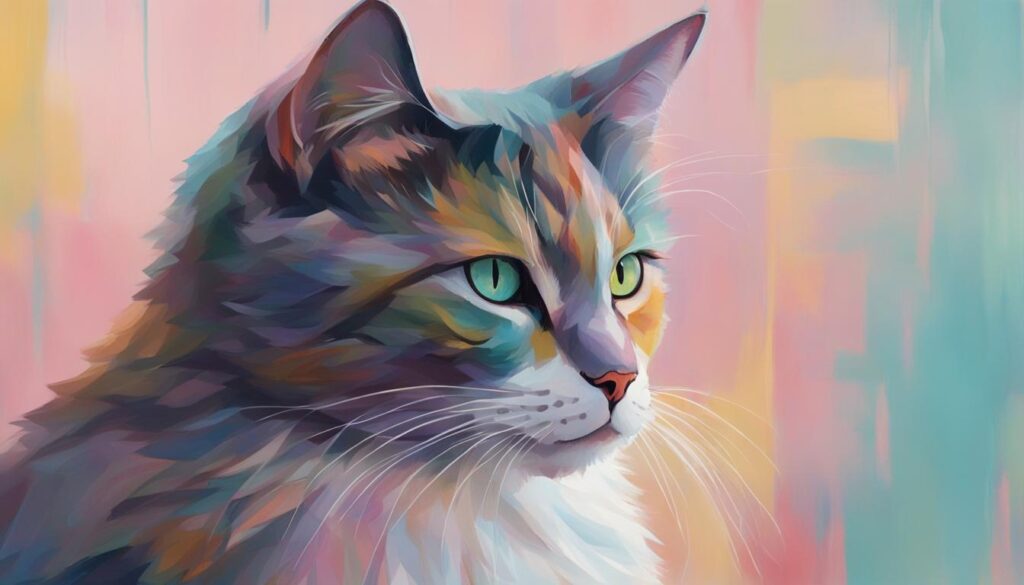As a cat owner, you may have noticed how your feline friend seems to pick up on your emotional state without you ever saying a word. You may be wondering, Can Cats Sense Anxiety? The short answer is yes. Cats have the innate ability to detect changes in our moods and body language, including anxiety.
But what makes cats such keen detectors of anxiety, and how do they react to it? In this section, we will explore the topic of feline intuition and their remarkable ability to sense anxiety in humans. We will go over what studies show about this unique bond between cats and humans and how their responses may vary depending on the individual cat’s personality.
Key Takeaways:
- Cats have a remarkable ability to sense anxiety in humans.
- Changes in body language and mood can tip off cats that their owners are anxious.
- Studies show that a cat’s personality can influence how they react to their owner’s anxiety.
- Understanding cats’ behaviors and reactions to anxiety can help owners provide better support for their furry friends.
- By recognizing and managing anxiety, individuals can promote a positive relationship with their cats and foster a healthy living environment.
Signs of Anxiety in Cats
If you are a cat owner, it’s essential to understand the signs of anxiety in cats to help your feline friend handle stress. Cats may display several changes in behavior when they are anxious, such as:
- Excessive grooming
- Hiding
- Aggression towards other animals or people
- Changes in appetite
If you notice any of these signs, it’s crucial to provide your cat with the support they need. Sometimes, a cat may become fearful or anxious for no apparent reason. Other times, it can be a reaction to a particular event.

“Cats seem to go on the principle that it never does any harm to ask for what you want.” – Joseph Wood Krutch
In the table below, you can find more signs of anxiety in cats and tips on how to help them:
| Signs of Anxiety in Cats | What to Do |
|---|---|
| Excessive vocalization | Provide a comfortable and quiet space for your pet to rest with toys and familiar surroundings. |
| Agitation, such as pacing, restlessness or panting | Speak to your vet to help identify the cause and recommend solutions. |
| Withdrawal from people, other pets, or activities he/she previously enjoyed | Offer extra attention through playtime, grooming, and snuggles. Make sure your pet has a healthy diet and enough water. |
Recognizing the signs of anxiety and taking the necessary steps to support your cat can improve their overall health and well-being.
Cats as Therapy Animals for Anxiety
If you’re struggling with anxiety, you may find comfort in the companionship of a feline friend. Cats make excellent therapy animals because of their calming presence and ability to sense human emotions.
Feline therapy has shown to reduce symptoms of anxiety, including decreased heart rate and blood pressure, and increased feelings of relaxation. The simple act of petting a cat can promote the release of endorphins, helping you feel happier and more relaxed.
To make the most of having a therapy cat, it’s important to understand feline anxiety and how to calm an anxious cat. Cats may show signs of anxiety when their environment changes, such as moving to a new home or experiencing changes in routine.
Understanding Feline Anxiety
Some common signs of anxiety in cats include excessive grooming, hiding, aggression, and changes in appetite. By identifying these behaviors, you can learn to recognize when your cat may be feeling anxious and provide them with extra TLC and support. It’s essential to create a safe and calm environment where your cat feels secure and at ease.
Calming Techniques for Anxious Cats
There are a few techniques you can try to help calm an anxious cat. One of the most effective is to provide your cat with a place where they can hide and feel safe, such as a cardboard box or a cozy cat bed. You can also consider using calming aids like pheromone sprays or diffusers.
Playing soothing music or dedicating regular playtime sessions can also help to distract an anxious cat and promote relaxation. By providing your cat with a structured routine and positive reinforcements, you can help ease their anxiety and create a stronger bond between you and your furry friend.

Remember, cats rely on our love and care to feel secure and happy. By taking the time to understand their needs and providing them with the right support, you can ensure your feline friend remains a calming and comforting presence in your life.
Conclusion
You now know that cats have an incredible ability to sense anxiety in humans. They can pick up on changes in body language, vocal tonality, and more. However, each cat’s reaction to anxiety can vary, so it is important to understand the signs of anxiety in cats to identify when your feline friend may be feeling stressed.
Some cats also make great therapy animals for anxiety. Their calming presence and ability to reduce stress levels can be incredibly beneficial to individuals experiencing anxiety.
Overall, by recognizing and leveraging the unique bond between humans and cats, we can create a harmonious environment that promotes well-being for both. So, the answer to the question “Can Cats Sense Anxiety?” is a resounding yes.
FAQ
Can cats sense anxiety?
Yes, cats have the ability to detect anxiety in humans. They are highly perceptive animals and can pick up on subtle changes in our behavior and body language that indicate we are feeling anxious. Cats may react to anxiety by displaying changes in their own behavior or by seeking to provide comfort and support to their human companions.
How do cats react to anxiety?
When cats sense anxiety, they may exhibit various behaviors such as increased vocalization, hiding, excessive grooming, or changes in appetite. Some cats may become more clingy and seek extra attention from their owners, while others may withdraw and become more aloof. It’s important to observe your cat’s behavior and provide them with the necessary support and reassurance if they are reacting to anxiety.
What are the signs of anxiety in cats?
Signs of anxiety in cats can include excessive grooming, hiding, aggressive behavior, urine spraying, excessive vocalization, changes in appetite, and avoiding social interaction. Each cat may exhibit different signs, and it’s crucial to pay attention to any unusual behavior or changes in their routine as these may indicate underlying anxiety.
Can cats be used as therapy animals for anxiety?
Yes, cats can be valuable therapy animals for individuals experiencing anxiety. The calming presence and unconditional love of a cat can have a soothing effect on people, reducing stress and promoting a sense of calm. Additionally, cats are often used in animal-assisted therapy to help individuals manage anxiety and improve their emotional well-being.
What are some techniques to calm anxious cats?
To help calm an anxious cat, it’s important to create a safe and comforting environment for them. Providing cozy hiding spots, engaging in interactive play sessions, using calming pheromone sprays or diffusers, and establishing a consistent routine can all help alleviate anxiety in cats. Consulting with a veterinarian or a feline behaviorist can also provide valuable guidance on managing feline anxiety.


